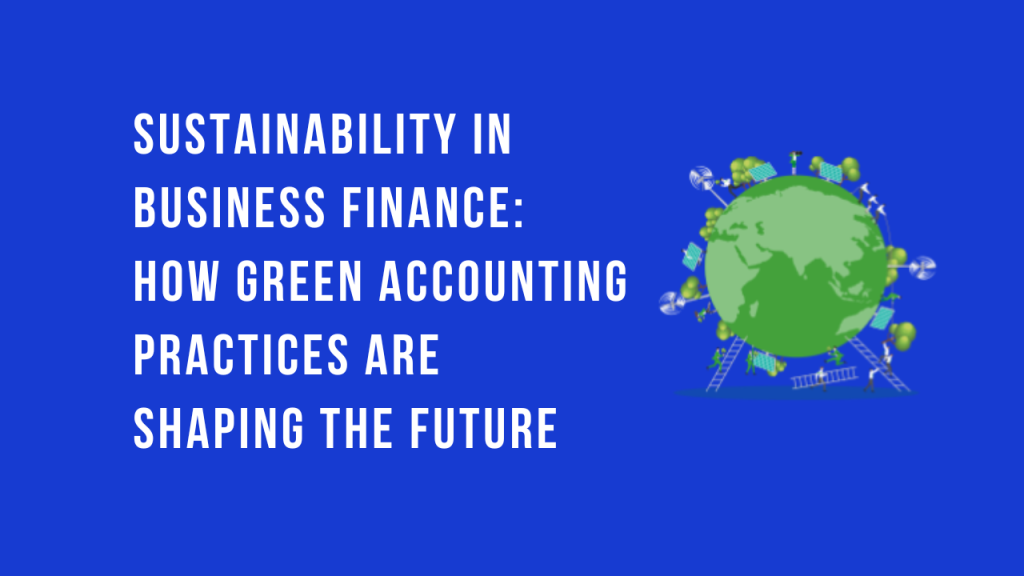In today’s rapidly evolving business landscape, sustainability has emerged as a core focus for companies aiming to balance profitability with environmental responsibility. As consumers and stakeholders become increasingly aware of environmental issues, businesses are shifting towards greener practices not only in operations but also in financial management. This shift has given rise to the concept of green accounting, a practice that integrates environmental factors into financial decisions and reporting.

What is Green Accounting?
Green accounting, also known as environmental accounting, refers to the process of incorporating environmental costs into financial management. This practice goes beyond traditional accounting by factoring in the economic impact of a company’s environmental activities, such as carbon emissions, resource consumption, and waste management. By quantifying these elements, businesses can better assess their environmental impact and make more informed decisions that align with sustainability goals.
Green accounting involves the use of specialized metrics and tools to measure the environmental costs associated with business activities. This can include the calculation of a company’s carbon footprint, the financial impact of environmental regulations, and the cost savings achieved through energy-efficient practices. By adopting green accounting, businesses can not only improve their environmental performance but also enhance their financial resilience in a world that increasingly values sustainability.
The Role of Green Accounting in Business Finance
Green accounting plays a pivotal role in business finance by helping companies align their financial strategies with sustainability objectives. This approach enables businesses to:
- Identify and Manage Environmental Risks: Green accounting helps businesses identify potential environmental risks, such as regulatory penalties, supply chain disruptions, and reputational damage. By incorporating these risks into financial planning, companies can develop strategies to mitigate their impact and ensure long-term sustainability.
- Optimize Resource Allocation: Through green accounting, businesses can track resource consumption and identify areas where efficiency improvements can be made. This not only reduces environmental impact but also leads to cost savings, making the company more competitive in the long run.
- Enhance Financial Reporting: Investors and stakeholders are increasingly demanding transparency regarding a company’s environmental performance. Green accounting allows businesses to provide accurate and comprehensive environmental data in their financial reports, building trust and credibility with stakeholders.
- Support Sustainable Investments: Green accounting enables businesses to evaluate the financial viability of sustainable investments, such as renewable energy projects and eco-friendly technologies. This ensures that companies can pursue growth opportunities that align with both their financial and environmental goals.
Benefits of Green Accounting for Businesses
The adoption of green accounting practices offers several benefits for businesses, including:
- Cost Savings: By identifying inefficiencies and reducing resource consumption, green accounting can lead to significant cost savings. For example, a company that implements energy-efficient technologies can lower its energy bills and reduce its carbon footprint.
- Regulatory Compliance: Green accounting helps businesses stay ahead of environmental regulations by providing accurate data on their environmental impact. This reduces the risk of non-compliance and associated penalties.
- Improved Reputation: Companies that demonstrate a commitment to sustainability through green accounting practices can enhance their reputation among consumers, investors, and stakeholders. This can lead to increased brand loyalty and attract environmentally-conscious customers.
- Access to Green Financing: As sustainability becomes a priority for investors, businesses that adopt green accounting practices may have better access to green financing options, such as sustainability-linked loans and green bonds. These financial instruments offer favorable terms to companies that meet specific environmental criteria.
- Long-Term Value Creation: By integrating environmental factors into financial decision-making, green accounting helps businesses create long-term value. Companies that prioritize sustainability are better positioned to adapt to changing market conditions, attract investment, and achieve sustained growth.
Challenges in Implementing Green Accounting
While green accounting offers numerous benefits, its implementation is not without challenges. Some of the key obstacles businesses may face include:
- Complexity: Green accounting requires the collection and analysis of complex environmental data, which can be challenging for companies that lack the necessary expertise or resources.
- Standardization: There is currently no universal standard for green accounting, which can make it difficult for businesses to compare their environmental performance with industry peers.
- Cost: Implementing green accounting practices may require upfront investments in technology and training, which can be a barrier for smaller businesses.
The Future of Green Accounting
As sustainability continues to gain traction in the business world, the importance of green accounting is expected to grow. Governments and regulatory bodies are increasingly incorporating environmental considerations into financial reporting requirements, and businesses that fail to adopt green accounting practices may find themselves at a competitive disadvantage.
Looking ahead, advancements in technology are likely to make green accounting more accessible and efficient. For example, artificial intelligence and data analytics can streamline the process of collecting and analyzing environmental data, making it easier for businesses to implement green accounting practices.
Conclusion
Green accounting is more than just a trend, it is a critical component of sustainable business finance. By integrating environmental factors into financial decision-making, companies can not only reduce their environmental impact but also enhance their financial performance. For businesses looking to stay competitive in the future, adopting green accounting practices is no longer an option—it is a necessity.
At Finout, we understand the importance of sustainability in today’s business environment. Our team of financial experts is here to help you navigate the complexities of green accounting and develop strategies that align with your sustainability goals. Contact us today to learn more about how we can support your business on its journey to a greener future.

